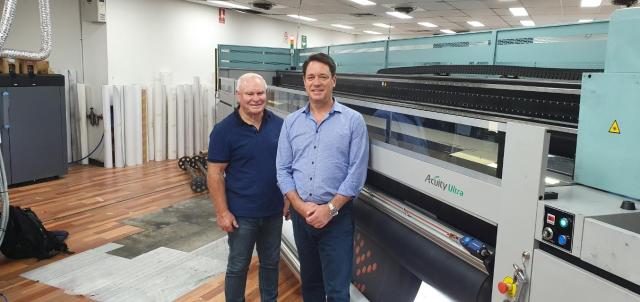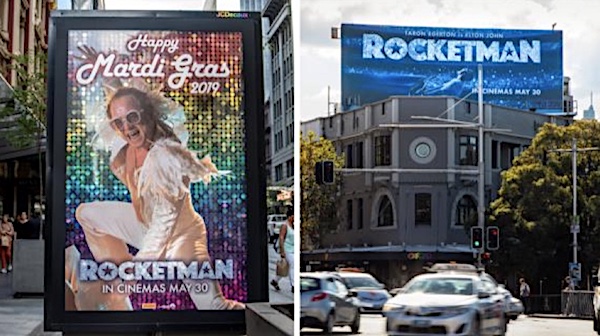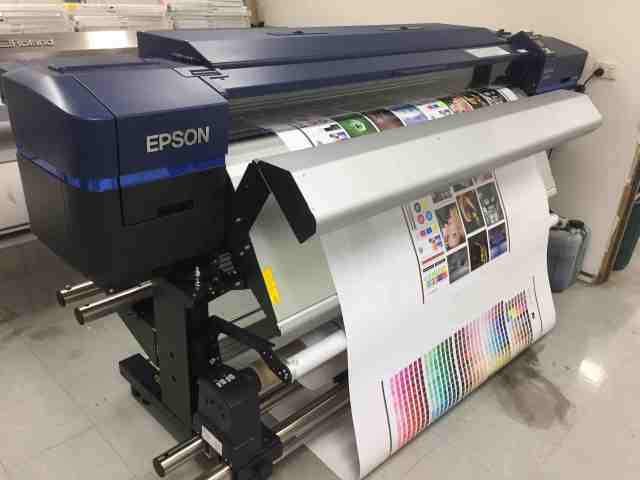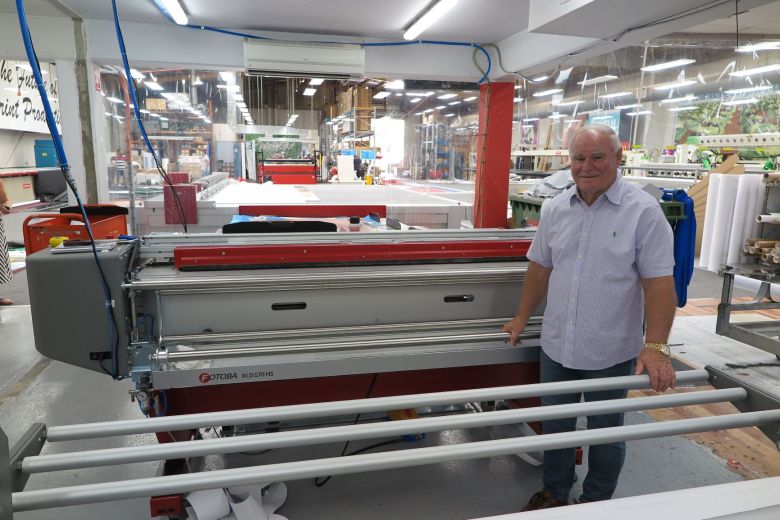
Cactus Imaging has installed an Australian-first Fotoba trimmer as the grand format specialist continues to get the balance right between its print and automated finishing capabilities.
The XLD170HS is the fourth Fotoba cutter to be installed at Cactus and was chosen for its ease of operation and maximum production speed of 34 lineal metres per minute, which the company said is by far the fastest of its kind.
Since Cactus Imaging’s parent company oOh!media purchased Adshel in 2018 a large share of print work is street furniture signage, in addition to grand format banners, home décor, fabric and point of sale.
Cactus Imaging now has nine grand format presses with the most recent addition – a Fujifilm Acuity Ultra 5044, one of the first five in its generation in the world – installed in December 2019.
The 5m workhorse press can print at 400 sqm/h, an increase on its predecessor’s 236 sqm/h, and has the additional feature of being able to print multi-roll, with three 300m rolls able to be set up to run independently.
This new press is the third Fujifilm to be installed with Cactus Imaging installing the 5044’s predecessor in November 2018, also in an Australian first. A Durst Rho 512r is another key plank in Cactus Imaging’s print stable.
Finishing automation needed to match print capacity
With so much grunt in the print room, the need to expand and automate finishing becoming ever more apparent for Cactus Imaging general manager of operations Keith Ferrel and general manager Nigel Spicer with the new Fotoba trimmer spotted at Fespa in 2019 fitting the bill.
The Fotoba range is also distributed in Australia through Quadient, formerly Neopost.
“This is the only complete one in Australia and it has only just been installed in the last few days,” Ferrel told Sprinter.
“This can trim up to 34 lineal metres a minute whereas the standard one is about six to eight lineal metres a minute. We can put jumbo 300 metre rolls on it of any substrate vinyl or Contravision for the bus windows and it can pretty much do all the trimming automatically.”
Ferrel saw the Italian made trimmer at Fespa in Berlin last year.
“Fotoba is the top of the tree as far as trimmers are concerned,” Ferrel said.
“We have worked with Fotoba for many years and we have three Fotoba trimmers here already. This one would trim at double the speed of all our others put together. We purchased it for the speed and reliability.”
“To give you an idea the billboards that we used to finish in the old days were all finished manually but we do such high volumes here now that it became such an issue with all the print capacity to be finishing these things off manually.
“So we had to come up with an idea to automate the finishing as much as we can and that’s now a really big focus for us.”
The investment continues the trend of finding equipment on tradeshow floors and working with the supplier to modify the equipment to suit the specific needs at Cactus Imaging.
Another addition is a Plastgrommet welder which handles the eyeletting, webbing and trimming for 300 metre rolls of mesh. Ferrel worked with the supplier to have a camera built-in and to also interface with Caldera software plus other features.
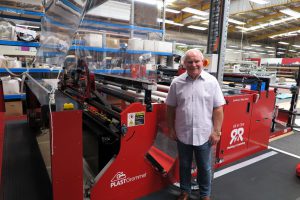
“This machine will put the webbing on and do the eyeletting for a 300-metre roll in about 20 minutes. It’s all automatic. You can set the eyelets for wherever you want. I saw a prototype of this machine at Fespa Munich; it’s made by a Spanish company,” Ferrel said.
“I spent probably the best part of nine months working with them to get the machine that we wanted and that’s pretty much standard for what they do now.
“Plastgrommet are very good guys to work with. We helped them with the further development of the machine. We liked the concept but it needed to be able to do a few extra things to meet our requirements.”
Other custom-made finishing solutions that Cactus Imaging has been involved in include working with US-based Miller Welders to construct an automated finishing solution that trims and applies kedder.
“We print all through the night and there would be 20 or 30 rolls of printed material ready to be finished and have the kedder applied. That would normally have taken two days to do manually.
“The banners are trimmed and then the kedder, or webbing, is applied. We had this specifically built in the last five years.”
“Nigel Spicer was the architect of this machine and worked with Miller in the USA to develop it. This was a world first. Cactus Imaging is well known throughout the world as an innovator and user of ground-breaking technology.”
Comment below to have your say on this story.
If you have a news story or tip-off, get in touch at editorial@sprinter.com.au.
Sign up to the Sprinter newsletter

